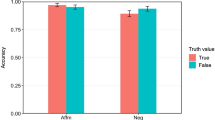Abstract
Three experiments are presented which tested the influence of negation on predication. Inferences draw on predications assumed to be certain, and implications draw on predications that are uncertain. Experiment I (136 subjects) found that presenting the behavior of an individual in the form of a negation invites the reasoner to select the opposite of two possible explanations accounting for the behavior in question (p <.05 or greater). Experiment II (85 subjects) found that this logical pull of negation extends to the changing of opinion (p <.004). Experiment III (99 subjects) demonstrated that people do cognize both inferentially and implicationally (p <.001); also, they recall descriptive terms better when they have been used inferentially than when they have been used implicationally (p <.001). It is argued that logical learning theory allows for the distinction between inference and implication whereas traditional computing and information-processing models do not, due to their Boolean presumptions.
Similar content being viewed by others
References
Barclay, J. R. (1973). The role of comprehension in remembering sentences.Cognitive Psychology, 4, 229–254.
Boole, C. (1958).The laws of thought. New York: Dover Publications. (Original work published in 1854).
Bransford, J. D., Barclay, J. R., & Franks, J. J. (1972). Sentence memory: A constructive versus interpretive approach.Cognitive Psychology, 3, 193–209.
Bransford, J. D., & Franks, J. J. (1971). The abstraction of linguistic ideas.Cognitive Psychology, 2, 331–350.
Brewer, W. F., & Lichtenstein, E. H. (1975). Recall of logical and pragmatic implications in sentences with dichotomous and continuous antonyms.Memory & Cognition, 3, 315–318.
Carey, S. (1978). The child as word learner. In M. Halle, J. Bresnan, & G. A. Miller (Eds.),Linguistic theory and psychological reality (pp. 264–293). Cambridge, MA: MIT Press.
Eysenck, M. W., & Keane, M. T. (1990).Cognitive psychology: A student's handbook. Hillsdale, NJ: Erlbaum.
Fillenbaum, S. (1966). Memory for gist: Some relevant variables.Language and Speech, 9, 217–227.
Gilbert, D. T. (1991). How mental systems believe.American Psychologist, 46, 107–119.
Gross, D., Fischer, U., & Miller, G. A. (1989). The organization of adjectival meaning.Journal of Memory and Language, 28, 92–106.
Harris, R. J. (1974). Memory and comprehension of implications and inferences of complex sentences.Journal of Verbal Learning and Verbal Behavior, 13, 626–637.
Johnson, M. K., Bransford, J. D., & Solomon, S. K. (1973). Memory for tacit implications of sentences.Journal of Experimental Psychology, 98, 203–205.
Johnson, W. E. (1922).Logic (part II): Demonstrative inference: Deductive and inductive. New York: Dover.
Lyons, J. (1977).Semantics (Vol. I). Cambridge, England: Cambridge University Press.
Reese, W. (1980).Dictionary of philosophy and religion: Eastern and Western thought. Atlantic Highlands, NJ: Humanities Press.
Richards, I. A. (1967). Introduction. In C. K. Ogden,Opposition: A linguistic and psychological analysis (pp. 7–13). Bloomington: Indiana University Press.
Rothbart, M., & Lewis, S. (1988). Inferring category attributes from exemplar attributes: Geometric shapes and social categories.Journal of Personality and Social Psychology, 55, 861–872.
Rychlak, J. F. (1988).The psychology of rigorous humanism (2nd ed.). New York: New York University Press.
Rychlak, J. F. (1991).Artificial intelligence and human reason: A teleological critique. New York: Columbia University Press.
Rychlak, J. F. (1994).Logical learning theory: A human teleology and its empirical support. Lincoln: University of Nebraska Press.
Rychlak, J. F., & Rychlak, L. S. (1991). Evidence for a predication effect in deciding on the personal significance of abstract word meanings.Journal of Psycholinguistic Research, 20, 403–418.
Rychlak, J. F., Stilson, S. R., & Rychlak, L. S. (1993). Testing a predicational model of cognition: Cueing predicate meanings in sentences and word triplets.Journal of Psycholinguistic Research, 22, 479–503.
Stillings, N. A., Feinstein, M. H., Garfield, J. L., Rissland, E. L., Rosenbaum, D. A., Weisler, S. E., & Baker-Ward, L. (1987).Cognitive science: An introduction. Cambridge, MA: MIT Press.
Trier, J. (1931).Der deutsche Wortschatz im sinnbezirk des Verstandes. Heidelberg: Winter.
Author information
Authors and Affiliations
Additional information
The writers would like to thank John D. Edwards for assistance on Experiments I and II, and Bernard L. Dugoni and Anne M. Sauer for assistance on Experiment III.
Rights and permissions
About this article
Cite this article
Rychlak, J.F., Barnard, S. The role of negation in implication versus inference. J Psycholinguist Res 25, 483–505 (1996). https://doi.org/10.1007/BF01706347
Accepted:
Issue Date:
DOI: https://doi.org/10.1007/BF01706347




